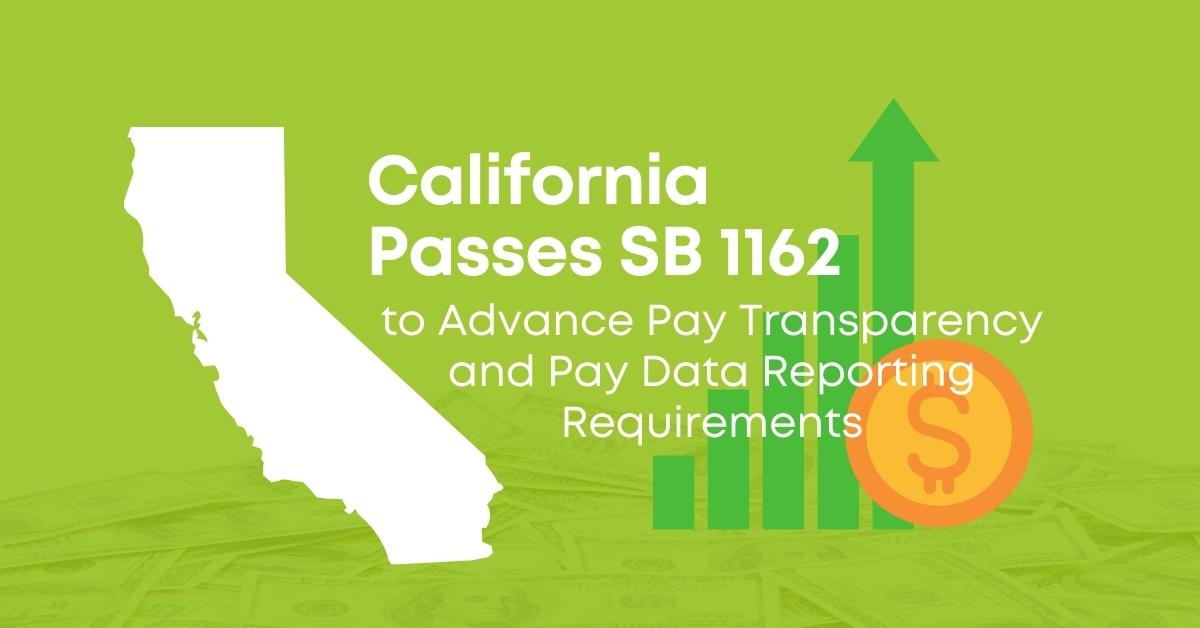1 min read
California Passes SB 1162 to Advance Pay Transparency and Pay Data Reporting Requirements
![]() OutSolve
:
Oct 7, 2022 2:00:16 PM
OutSolve
:
Oct 7, 2022 2:00:16 PM

Requires sharing salary ranges to applicants and pay scale information to employees, upon request, and submit a more detailed pay data report
On September 27 2022, SB 1162 was signed by California Governor Gavin Newsom. The bill requires employers with more than 15 employees to:
- Make salary ranges available to applicants and employees. Previously employers only had to provide this information to applicants and employees upon request.
- Include a pay scale in all job postings and provide that information to third party vendors posting jobs for the employer.
- Provide the pay scale to current employees upon request (all employers, regardless of size).
- Maintain a record of each employee’s job title and wage rate history throughout their employment and for three years thereafter.
Expanded Pay Data Reporting
Employers with 100 or more employees must report to the state for each establishment “within each job category, for each combination of race, ethnicity, and sex, the median and mean hourly rate." Employers will no longer be required to submit a consolidated report.
This reporting requirement also passes to private employers that retain 100 or more employees hired through labor contractors within the prior calendar year, e.g., hired through temporary staffing agencies. This additional report must also disclose the “ownership names of all labor contractors used to supply employees.” The bill does not contain a separate mandate for the labor contractors to collect the “necessary pay data.”
The new obligations take effect on January 1, 2023, with the first pay data reporting deadline of May 10, 2023, and annually thereafter on the second Wednesday of May. The first report will be based on the calendar year 2022 pay data.
The California Civil Rights Department (CRD) may ask the court to impose civil penalties of up to $100 per employer for the first offense for failing to file the required reports or make the required disclosures. For any subsequent failures, the civil penalties may be up to $200 per employee. Aggrieved parties will be able to file a complaint with the Labor Commissioner or a civil action for injunctive relief or other relief as determined by the court.

OutSolve’s Take
California will now become the only state to require employers to look at pay practices in a more detailed manner evaluating each combination of race, ethnicity, and sex. The California bill will mean that employers should conduct more in-depth analyses of compensation to ascertain whether certain demographic groups are represented in the higher paying vs. lower paying jobs within the organization.
Founded in 1998, OutSolve has evolved into a premier compliance-driven HR advisory firm, leveraging deep expertise to simplify complex regulatory landscapes for businesses of all sizes. With a comprehensive suite of solutions encompassing HR compliance, workforce analytics, and risk mitigation consulting, OutSolve empowers organizations to navigate the intricate world of employment regulations with confidence.
Weekly OutLook
Featured Posts

HR Compliance Checklist: What Every HR Pro Needs to Know

New Year, New Deadlines: 2026 HR Compliance Calendar
Related Posts

How to Compliantly Recruit for Section 503 and VEVRAA
Recruiting under Section 503 and the Vietnam Era Veteran’s Readjustment Assistance Act (VEVRAA) can feel like a balancing act, combining compliance...

Common Mistakes Employers Make in Pay Equity Audits
This article is part of an ongoing legal series designed to provide insight and practical guidance on current and emerging workplace compliance...

5 Key Compliance Items HR Can’t Afford to Ignore
Staying ahead of compliance changes can feel like a race against time for anyone in HR. Policies change and reporting requirements expand, making...